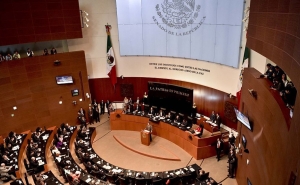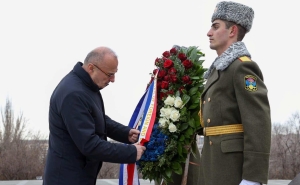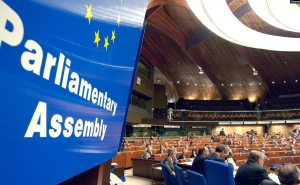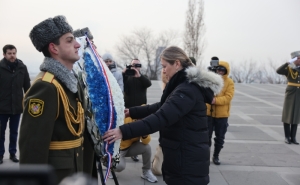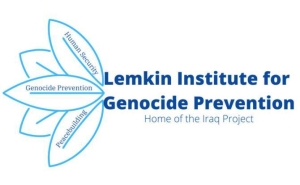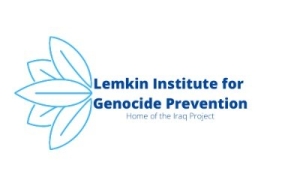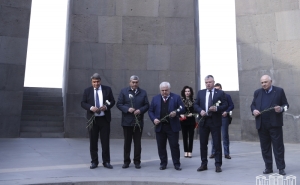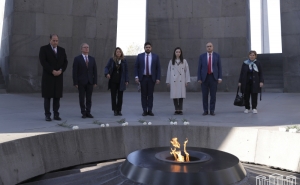Yeghia Tashjian: Armenia has the Potential to Become a Regional Center for Academic Researches
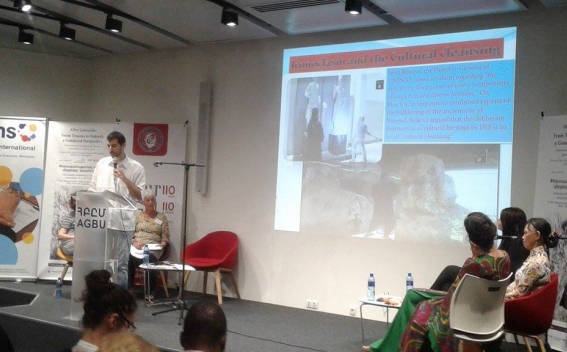
"Armdedia" IAA presents an interview with Yeghia Tashjian, the founder of New Eastern Politics blog/forum. Currently he is the regional officer of Women in War and research assistant at Armenian Diaspora Research Center at Haigazian University.
From 16-19th of September he participated in an international conference in Yerevan, entitled "A Gendered Perspective" which was organized by Women in War in partnership with the Institute of Archaeology and Ethnography in Yerevan and AGBU and DVV International.
- What was the purpose of the international conference and why it was held in Armenia?
- The conference "After Genocide: From Trauma to Rebirth: A Gendered Perspective" which was organized by Women in War in partnership with the Institute of Archaeology and Ethnography in Yerevan and AGBU and DVV International. This international conference was unique in its kind because firstly it was about how generations grew up inheriting a genocide or mass violence in their family history and secondly how these experiences were considered from a gendered perspective. For sure, we stressed on women’s perspective since it has been not researched well. Thus the conference was based on the aftermath of prolonged and intersected trauma and its prevention. After the commemoration of the centennial of the Armenian Genocide it was very important to go one step further and examine what the next generations inherited, transmitted and built. This can be seen clearly in the Diaspora communities, whether for the Armenians, Jews, Palestinians and others.
Armenia is the center of the genocide studies. For the first time such topic was addressed in Armenia, it was important to see things from gendered perspective, too, though sometimes challenging. I believe the comparative studies that we made were very useful to many Armenian scholars or young academics, who wanted to go deep in Genocide studies. It’s good to see things from different and comparative perspectives and it was an attempt to build bridges between comparable experiences.
- On what bases the participants were chosen and what were the topics?
- In the beginning we had more than hundred of applicants. It was a challenging option. There were too many good papers and interesting topics. We decreased the number to 52. But the applicants were chosen based on their topics. We had papers from different countries, different topics and also stressed to keep a balance between the participants. Not all participants were academics. Some were activists that survived genocides and presented their experiences in post-genocide family history. The papers were presented in Armenian, English and also French. The topics addressed the post-Genocide traumatic life of Armenians, Jews, Palestinians, Bosnians, Congolese, Rwandans, and the ongoing genocides in Middle East against the Yezidis, Christians and Kurds.
- How this conference differed from other conference related to the Genocide and how can Armenia use this experience?
- Well, it deferred on many levels. First, we stressed on the after Genocide traumatic period and not on the violence and "quantitative war" (who died more) during the genocide period. Second, the combination of academic life and activism was something new for many participants. During coffee breaks each was explaining his/her experience or view of the Genocide from his/her perspective. Finally, questions were raised how to prevent a genocide and how the transmission of identity plays a role in reshaping the post-Genocide identity of the victims, whether in the homeland or in the Diaspora. Armenia can take advantage from such conference by cooperating with many researched based think tanks. Armenia has the potential to become a regional center for academic researches due to its newly founded startups and academic centers. In my last visit to Armenia I realized that many journalists and students were interested in the political situations of the Middle East and that gender plays a role to identify these conflicts in the region.
- What was your presentation about?
- The title of my presentation was "End of civilization? From Cultural cleansing to Genocide: the plight of Christians in Syria and Iraq", where I raised the question what if the Christians especially the Assyrian-Aramean community was undergoing a genocide and how does the gender factor play into this. I faced some challenges since it was not easy for me to conduct interviews with Assyrian or Syriac refugees. It's sad and alarming that Christians now make up around 5% of the Middle Eastern population, a tangible decrease from an estimated 20% in the early 20th century. With the US-led invasion to Iraq in March 2003, Christian communities in Iraq such as the Assyrians became a target of "Jihadi" movements, who forced thousands of Assyrians to leave their ancestral homeland. In 2014, for the first time in history, Nineveh, the capital of ancient Assyria, was emptied from its indigenous population. ISIS burnt and looted Christian villages and destroyed churches and pre-biblical monuments. The UNESCO termed the catastrophe as "cultural cleansing". In my presentation I quoted James Noye’s book The Politics of Iconoclasm where he argues that the destruction of religious or historic monuments have religious or political motives. What ISIS was doing was a destruction of the Christian identity of Assyrians and other groups; since by depriving them of their culture, it deprived them of their history, heritage and future. That is why it goes hand in hand with Genocide. Along with the physical persecution, ISIS wanted to eliminate the memory of these different cultures that existed in the region for centuries.
- What are the future plans of the organization of Women in War?
- Well, our aim is to raise awareness and take policy-making actions through lobbying and activism to prevent the persecution of minorities and especially women during wars. That’s why we passed a resolution in Yerevan calling to end the persecution of Kurds in Turkey. Now we are planning for our next conference which will be held in Odessa, Ukraine, dedicated to "Gender in Revolution; Women and men experiencing revolutionary change 1917-2017" in partnership with the Democratic Development Center (Kiev) and other partners. The aim of the conference will be to study the participation of women during revolutions and her role in shaping or reshaping the revolutionary society. Sure, the model of Rojava in Syria and the system of gendered equality will be the core of the conference.
-
 17:08
17:08The regular session of the Anti-corruption Policy Council takes place in Jermuk
-
 15:05
15:05The Prime Minister sends congratulatory messages to the supreme leader of Iran and the President of Iran
-
 11:11
11:11Armenia sends earthquake aid to Turkey
-
 10:43
10:43Commemoration of the Pontiff St. Sahak Partev
-
 09:16
09:16Some roads are closed and difficult to pass in Armenia
-
 19:55
19:55Phone conversation of the Foreign Minister of Armenia with the U.S. Assistant Secretary of State for European and Eurasian Affairs
-
 18:30
18:30Prime Minister Pashinyan and President Khachaturyan meet
-
 18:20
18:20Ararat Mirzoyan with Co-Chairman of the OSCE Minsk Group of France Brice Roquefeuil
-
 17:01
17:01Humans could land on Mars within 10 years, Musk predicts
-
 16:45
16:45France, US urge 'immediate' end to Nagorno Karabakh blockade
-
 16:01
16:01Blockaded Nagorno Karabakh launches fundraiser to support quake-hit Syria
-
 15:59
15:59Earthquake death toll in Turkey rises to 18,342
-
 15:43
15:43Ararat Mirzoyan Held a Telephone Conversation with Sergey Lavrov
-
 15:06
15:06French president rules out fighter jet supplies to Ukraine in near future
-
 14:47
14:475 Day Weather Forecast in Armenia
-
 14:44
14:44President Vahagn Khachaturyan wrote a note in the book of condolences opened in the Embassy of Syria in Armenia
-
 14:20
14:20Azerbaijan’s provocations impede establishment of peace and stability – Armenian FM tells Russian Co-Chair of OSCE MG
-
 12:57
12:57France representation to OSCE: Paris calls on Azerbaijan to restore freedom of movement through Lachin corridor
-
 11:40
11:40Command of Kosovo forces highly appreciated preparation of Armenian peacekeepers
-
 10:16
10:16The United States withdrew from sanctions against Syria for six months the provision of assistance after the earthquake
day
week
month
Humidity: %
Wind: km/h


